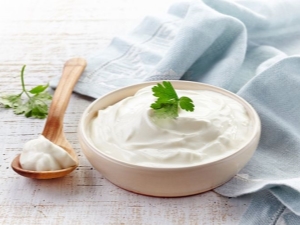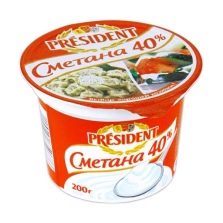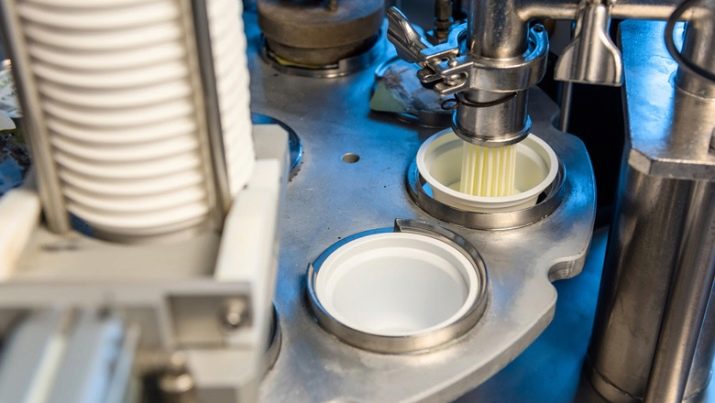Can I use sour cream during breastfeeding and what are the contraindications?

After the birth of the baby, the diet of a nursing mom should contain a lot of healthy dishes.For more breastmilk and proper digestion of the baby, gynecologists and pediatricians recommend consuming as much dairy products as possible. However, the protein contained in whole cow's milk is poorly absorbed by young children, so it is best to eat dairy products, of which sour cream is one of the most popular.
Composition and types
Sour cream got its name due to the fact that the milk, which was warm and fermented, appeared a layer of very thick and rich cream. They were “swept away” by a spoon in a separate container, after which the resulting mass was called “sour cream”. As a result of this ripening, the milk protein changes its structure, and the white liquid turns into a thick yellowish-white mass.
The caloric content of a fermented milk product depends on its fat content and can vary from 119 to 293 kcal per 100 g. In addition, the nutritional value of the product depends on the fat content, so the protein content can vary from 2 to 4 g; carbohydrates from 3 to 4 g; fats from 10 to 30 g
Sour cream taken from whole milk is a more useful product for HB (breastfeeding) than cottage cheese and even cream, due to the high content of beneficial substances:
- high content of vitamin A, C, E, PP, K, D, a large amount of B-group vitamins, for example, B1, B6, B4, and B12;
- a variety of micro and macro elements: sodium, selenium, phosphorus, zinc, magnesium and, of course, calcium;
- high content of protein and milk fat, which is necessary for the production of breast milk.
Depending on the amount of fat in 100 g of sour cream, it is divided into several types:
- low fat sour cream 10 and 15%;
- medium-fat varieties of 20 and 25%;
- fatty sorts of sour cream 30, 35 and even 40%.
In addition to the fat content, fermented milk mass can be classified according to the method of its preparation, which may differ from different manufacturers.
- Smooth sour cream It is produced by analogy with the most ancient ways of obtaining a product. Milk is skvashivayut and removed from it a thick top layer.
- Separated product manufactured using special equipment. In such equipment, whole milk is divided into skimmed and cream. After this, the starter is placed in the cream itself, and after some time thick sour cream is fermented.
The benefits and harms of the product
Due to its rich composition, fermented fermented milk mass has many beneficial properties for both the baby and his mother. Calcium is useful for the growth and development of the child’s bone skeleton, as well as helping to restore its lack in the parent’s body, since after giving birth every second person has problems with hair, nails and teeth. Sodium is responsible for regulating the water-salt balance in the body and is involved in metabolic processes.
Phosphorus stimulates the activity of brain cells, which is why it is so necessary for a growing body, because in the first year of life a baby daily learns and assimilates a huge amount of information about the structure of the surrounding world.
Optimal magnesium levels in the body of the woman who gave birth are responsible not only for her immune system, but also for the baby’s immunity. Since in the first months after birth, the child has not yet fully formed and his own system has begun its work. Copper and iron are responsible for blood formation and saturation of tissues of muscles and organs with oxygen, which is especially important for kids who have problems with the work of the respiratory tract.
Large amounts of B vitamins, vitamins C and A are responsible for protecting the body against infectious and viral diseases, which is also important for breastfeeding moms. Vitamin E regulates the work of the thyroid gland, which is also useful for both the growing baby and the nursing mother, whose hormones are unstable after birth.
In addition, one of the main requirements for breastfeeding is a fairly high caloric daily diet, since this process is very energy-intensive for breastfeeding.At the same time, high carbohydrate products are not suitable for such a diet, since a lot of protein is needed for the production of breast milk. As its source, experts almost unanimously recommend eating cottage cheese mixed with sour cream. This dish contains a large amount of protein and at the same time quite caloric in order to comfortably gain the average daily rate of nursing mothers.
Unfortunately, not all moms can use sour cream in their daily diet. This fermented milk product has contraindications.
- Allergic reactions and individual lactose intolerance to the mother or baby. Unfortunately, an allergy or inability to digest milk protein can lead to rashes and swelling, redness and inflammation of the skin. In this case, the body of a nursing woman can perfectly digest the sour cream, and the baby can become allergic to mother's milk.
- Digestive disorders. Although milk fat is good for making breast milk, it is very hard to digest. Especially it is a lot in fatty sorts of sour cream 30-40%. Both mothers and babies can experience colic, bloating, and loose stools after a lactating woman eats a large amount of a fermented milk product.
- Poisoning. Unfortunately, not all manufacturers and sellers are law-abiding and decent people. By production of sour cream the technology can be broken. The product may lie in the store longer than the shelf life, may be packaged leaking. To protect yourself from poisoning with dairy products, you need to carefully examine the packaging, the composition of the product and the date of its manufacture.
It is best to choose proven suppliers and stores with good ratings.
Rules and terms of use of sour cream by a nursing mother
Before you start eating cottage cheese with fat sour cream every evening, you need to check how the organisms of the woman and the baby react to it. In the first months of a baby’s life, pediatricians and allergists advise against refusing to purchase and use this product. Enzymes of the stomach and pancreas are still not enough to digest such a heavy substance, so intestinal disorders and colic can occur.
The optimal term for introducing sour cream into the diet of a nursing mom is considered to be the 4th-5th month after birth.
It is desirable to introduce fermented milk product into the diet of a nursing woman gradually. At the first stage, it is enough to eat 1-2 tablespoons of white mass and wait about 48 hours. If neither mom nor baby has any negative reactions detected, then the amount can be gradually increased to 50 g per day. It is best to use sour cream as a dressing for a vegetable or fruit salad, in light desserts and as a sauce for hot dishes. It is best to eat it no more than 3-4 times a week.
In addition to the quantity of the product, special attention must be paid to its quality.
- Do not choose too fatty varieties. It is best to take 10% sour cream or 15%.
- The composition should not contain preservatives, reconstituted or skimmed milk and artificial additives. It is best if only whole raw materials and live microorganisms are indicated on the packaging.
- Since products without preservatives can not be stored for too long, you should choose sour cream with the lowest shelf life. It should not exceed two weeks.
- After opening the package, the fermented milk product must be consumed within 48-72 hours. Its further storage in the refrigerator and the use in food of the feeding mother is inadmissible.
How to cook with your own hands?
In cases where the finished product on the shelves of stores does not cause confidence, but there is an opportunity to purchase whole cow or goat milk, then the best option would be to make sour cream with your own hands. This can be done in a simpler but more durable way or in a more complicated, but fast. At the same time, sour cream obtained from goat milk is considered more beneficial for the baby than fermented cow milk.
In the first case, it is enough just to put the milk in the fridge and for a couple of weeks to remove sour cream from its surface that forms naturally. At the same time it is very important to ensure that no dirt or garbage gets into the milk, otherwise it will sour instantly. Spoon, which will be removed sour cream, should be thoroughly washed and dried naturally. It is best of all to store the mass removed from milk in an airtight container, with each new mixture being thoroughly mixed. In the second case, you must warm the milk and squash it yourself.
Souring occurs in several stages:
- warm milk is poured into a clean jar, and its neck is wrapped tightly with gauze;
- the can is put in a warm place for 3-5 days, after which the resulting sour mass is poured through a sieve into a deep pan;
- after half an hour, the massed mass is whipped with a whisk or mixer at a slow speed and put into the refrigerator, hermetically sealed.
Low-fat sour cream is one of the most useful sources of milk fat and protein for a nursing mother.
If you follow all the recommendations of experts, as well as choose a quality product, then no problems with the digestion of the woman herself or her child will happen. A delicate taste of sour cream and its creamy consistency will significantly diversify mom's diet menu for HB.
About 10 nutritional tips for a nursing mother can be found in the following video.






























